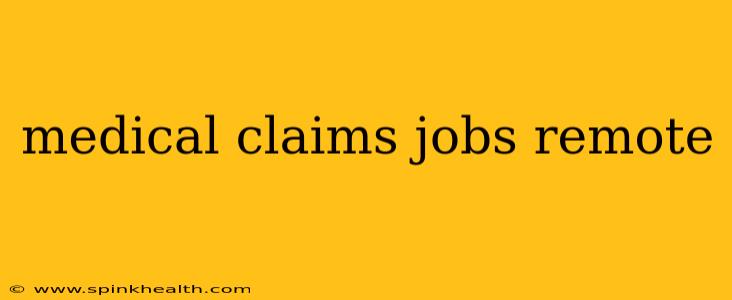Navigating the World of Remote Medical Claims Jobs: A Story of Flexibility and Expertise
The hum of the computer, the gentle click of the keyboard – this isn't the sterile environment of a bustling office, but my home office. For the past three years, I've been a remote medical claims specialist, and it's been a journey filled with both challenges and incredible rewards. This isn't just a job; it's a lifestyle shift that's given me the flexibility to balance my career with my personal life. But the path to finding this perfect work-from-home arrangement wasn't always smooth. Let me share my story and guide you through the landscape of remote medical claims jobs.
What Exactly Does a Remote Medical Claims Specialist Do?
This is often the first question that pops up. Essentially, we're the unsung heroes of the healthcare system, ensuring that medical providers receive their rightful payments. We meticulously review medical records, insurance policies, and billing codes to ensure accuracy and compliance. Think of it as being a detective, piecing together medical information to navigate the often complex world of healthcare billing. We identify errors, resolve discrepancies, and advocate for timely reimbursement. Remotely, this involves a lot of computer work, strong communication skills (both written and verbal), and an unwavering attention to detail.
What are the key skills needed for remote medical claims jobs?
This is a crucial question, and the answer isn't just "knowing medical billing." While a strong understanding of medical coding (CPT, HCPCS, ICD) and billing procedures is paramount, successful remote medical claims specialists also possess these vital skills:
- Technical Proficiency: Mastering various software systems is key. Electronic health record (EHR) systems, claims processing software, and secure communication platforms are just the beginning.
- Analytical Skills: Sifting through medical data requires exceptional analytical abilities to identify errors, inconsistencies, and potential issues.
- Problem-Solving Skills: Medical billing is rarely straightforward. The ability to creatively solve problems and find solutions efficiently is a must.
- Communication Skills: Whether it's communicating with providers, insurance companies, or internal teams, clear and concise communication is vital.
- Time Management: Working remotely demands excellent time management and organizational skills to stay on top of deadlines and maintain productivity.
What kind of companies hire for remote medical claims positions?
The landscape is broad. You'll find opportunities with:
- Healthcare Billing Companies: These companies specialize in medical billing services and often offer remote positions.
- Insurance Companies: Some insurance companies have remote roles for claims processing and adjudication.
- Physician Practices (Larger Groups): Larger practices sometimes offer remote positions for experienced billers.
- Outsourcing Companies: Many companies specialize in outsourcing medical billing services, providing remote opportunities.
How can I find remote medical claims jobs?
The hunt requires strategic effort. My advice?
- Online Job Boards: Indeed, LinkedIn, Monster, and specialized healthcare job boards are great starting points.
- Company Websites: Directly checking the career pages of companies that interest you can yield hidden gems.
- Networking: Connecting with professionals in the healthcare field can lead to unexpected opportunities.
Are there any certifications that can help me land a remote medical claims job?
Absolutely! Certifications like Certified Professional Coder (CPC) or Certified Billing and Coding Specialist (CBCS) demonstrate your expertise and can significantly improve your job prospects. These certifications are widely recognized within the industry.
What are the challenges of working remotely in medical claims?
While the flexibility is amazing, there are hurdles:
- Isolation: Working from home can sometimes feel isolating. Building a strong support network, both professionally and personally, is vital.
- Technology Dependence: Reliable internet and technology are essential. Technical issues can significantly impact productivity.
- Maintaining Boundaries: Setting clear boundaries between work and personal life is crucial to avoid burnout.
In the end, finding a fulfilling remote medical claims job requires dedication, the right skill set, and a bit of perseverance. It's a journey worth taking, offering a blend of expertise, flexibility, and the chance to make a real difference in the healthcare landscape from the comfort of your own home. My story is just one example – yours could be even more remarkable.

